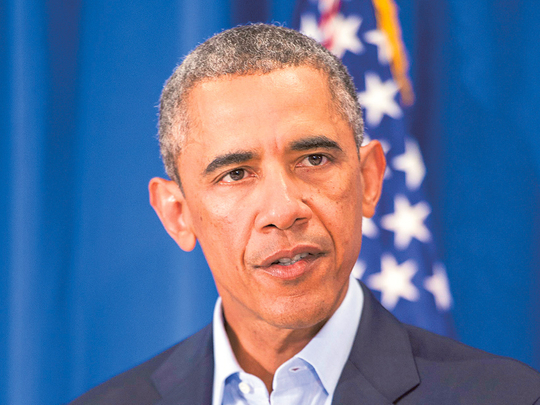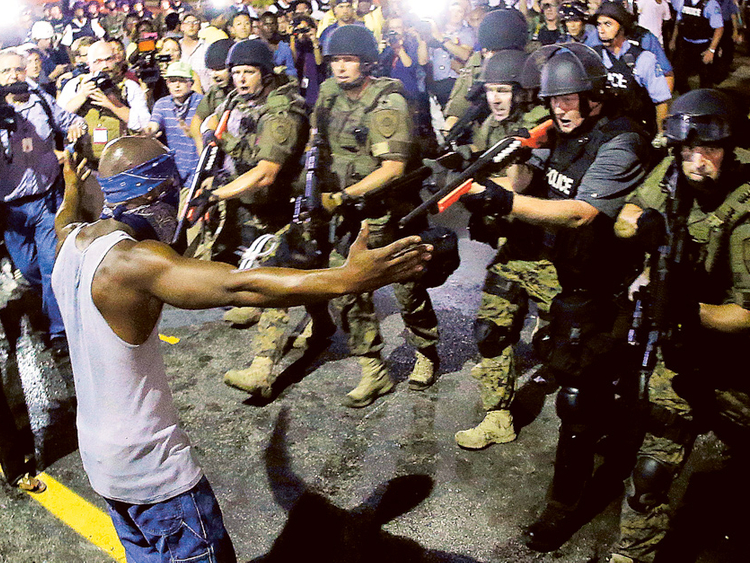
WASHINGTON: It has become common among America’s political chattering class to speak of a sense of drift in this, Barack Obama’s sixth year as US president. One could argue that, historically speaking, this is par for the course. For second-term American presidents the pattern is clear: the emotional and political high of a successful re-election campaign leads to presidential over-reach. In due time the president crashes back to earth, but later recovers. Once the political world’s attention shifts to the choice of the next president, the current one can spend his final 18 months or so in the White House focusing on foreign affairs and policies designed to build his “legacy.”
There may be light at the end of the tunnel, but, in the meantime, Obama presides over an administration that even some of his allies describe as directionless at a time when he is besieged on all sides by crises. Depending on one’s political point of view these crises are either evidence that the world has changed, making it impossible for America to set the global agenda the way it once did, or they are proof that the Obama administration has diminished the country’s standing, making it impossible for America to lead even if it wanted to do so.
Barack Obama is one of the most gifted public speakers of his generation — a fact that Republicans and Democrats alike acknowledge and which was at least partially responsible for his meteoric political rise.
Yet, one of the enduring paradoxes of his presidency is how poor a job Obama has sometimes done as a communicator. He allowed his political opponents to define his most important domestic policy initiative — health care reform — in unpopular ways. As a result, he has spent years defending the policy against a tidal wave of misinformation. More recently, as Iraq has slid ever-further into chaos, Obama let his critics dominate discussion of the issue with the claim that Iraq would be stable today if the American army still occupied it. Aside from being a highly debatable prospect on its face this ignores the fact that it was not Obama but George W. Bush who negotiated the US-Iraq troop withdrawal agreement. In a similar vein conservatives claim that Russia’s aggressive approach to Ukraine over the last six months can be blamed on a lack of forceful rhetoric (and a willingness to back it up) on Obama’s part.
It is not, however, only the president’s political enemies who have begun to wonder about his approach to the wider world. Hillary Clinton, once his political opponent, later a loyal deputy to Obama as Secretary of State, recently used an interview with The Atlantic, a widely respected magazine, to put some distance between herself and her former boss.
“Great nations need organising principles,” she said, “and ‘don’t do stupid stuff’ is not an organising principle.”
The reference is to an oft-quoted Obama remark from his first presidential campaign. Even allowing for the fact that as a likely presidential candidate Clinton has political needs and concerns very different from Obama’s, her comment gets to the heart of a larger truth about Obama’s approach to both politics and policy.
In the eyes of many of the people who voted for him in 2008 Obama was a transformative figure. Race played a big part in this, but age was also a big factor. Obama is about 15 years younger than Bill and Hillary Clinton and more than 20 years younger than the man he beat that year, John McCain. Barely a teenager when the Vietnam War ended he was neither moved by the passions nor haunted by the demons that have defined that war’s young people — the generation to which the Clintons, McCain and Mitt Romney all belong.
The intense polarisation of modern American politics has its roots in that era. For Americans Obama’s age (he was born in 1961) and younger, it sometimes seems as though the entire country chose sides over the Civil Rights movement of the 1950s and 60s, and the later anti-Vietnam War movement of the 60s and 70s and has remained divided along the same lines ever since.
Obama promised an end all that — sometimes metaphorically, occasionally literally. Though capable of arousing great passion as a speaker it is sometimes forgotten that he did so with appeals to the broad middle of American politics.
He entered the White House believing that common sense and compromise could isolate the extremes and move the country forward, but failed to appreciate that while most Americans are, indeed, basically moderate, modern American politics at the congressional level tends to reward candidates at their respective party’s extremes. (A cynic might observe that this makes him only the latest president to arrive in Washington promising radical change, only to be crushed by the city’s entrenched culture.)
This also explains what many see as his passivity in the face of accusations that he did too little to stop the 2012 attack on the US consulate in Benghazi, the IRS’s pursuit of his political opponents, the Israel-Hamas war in Gaza or illegal immigration across the US border with Mexico. Implicit in his approach to politics is the presumption that politicians and the public alike will recognise the proper policy solution as they negotiate their way towards it, and will understand the limits of American power when a careful examination of circumstances makes them obvious.
Viewed this way the administration is not adrift. Rather it is thoughtful and careful in a world where everyone’s security requires precisely these attributes. As far back as the 2008 campaign one of Obama’s greatest appeals was the promise that he would think carefully and weigh every option before acting — in marked contrast to his predecessor, who prided himself on acting mainly on gut instinct.
The problem is that voters and other politicians say they want “careful and thoughtful”, but when crises appear what they demand is bold and decisive action. This dynamic was on display most recently in the Obama administration’s approach to the challenge of the Islamic State group in the Middle East and to the violence that gripped Ferguson, Missouri, after police there killed an unarmed black teenager.
In both cases the approach was careful and deliberate. People passionate about both issues called the administration frustratingly slow and indecisive, to which the White House countered that in difficult and volatile situations it is important not to make things worse by acting rashly. Calling for calm and opening a federal civil rights investigation may well have been Obama’s best option in Ferguson, but is unlikely to salve the wounds opened by the violence there. Warnings and strictly limited military action in northern Iraq displays an appreciation that America is a nation tired of war, but it is not likely to have a lasting effect on IS (a fact acknowledged this week by both Secretary of Defense Chuck Hagel and by the Chairman of the Joint Chiefs of Staff).
The more immediate question is whether the sense of drift that currently surrounds the administration is a normal sixth-year lull, or something that goes deeper, and is, perhaps, connected with what feels like the president’s own disillusionment with Washington itself.
Barack Obama arrived in Washington as the spokesman for the belief that polarisation is an aberration and that sensible people talking things through can almost always find some sort of compromise. That is a noble theory, but in an era when many Congressional Republicans won election by promising never to compromise with Democrats in general and Obama in particular it has not proven to be a winning strategy for government. The question that hangs over Obama’s remaining time in office is how he will react when presented by Republicans with more of the same.
Gordon Robison, a longtime Middle East journalist and US political analyst, teaches political science at the University of Vermont.














